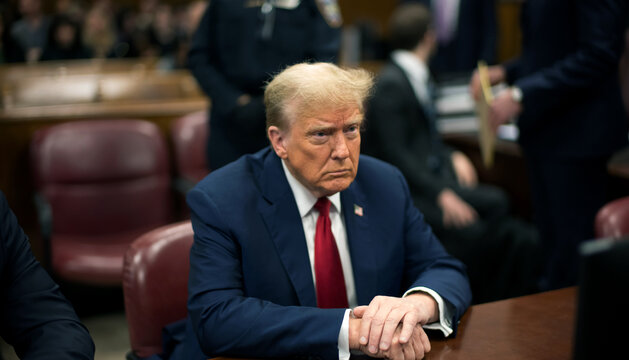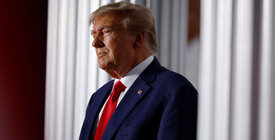
The Civil Rights Law Used to Indict Trump
Charging the former president for his efforts to overturn the 2020 election continues a long legal legacy of guarding against election subversion.

Part of
UPDATE: On August 1, Trump was charged with violating the law detailed in this article.
Federal prosecutors have notified Donald Trump that he is being investigated for his efforts to overturn the 2020 election, meaning that Trump could soon face his third criminal indictment since March. While exact details of the possible charges remain unknown, the target letter he received reportedly mentions a civil rights law that has historically been used to safeguard elections from interference. It’s a salient reminder of the powerful legal tools available to counter the dangers of the still-active election denial movement that Trump unleashed.
Special counsel Jack Smith is investigating Trump’s alleged actions ahead of the January 6, 2021, attack on the Capitol, such as pressuring Vice President Mike Pence to block the certification of Joe Biden’s 2020 victory, pushing state and local officials to change election results, and peddling false claims about the election. The facts that may come to form the basis of an indictment haven’t been disclosed, but the target letter reportedly cites various federal statutes that may be used to charge the former president. Among these is Section 241 of Title 18 of the U.S. Code, a law dating back to the Reconstruction era.
The provision was originally passed as part of the Enforcement Act of 1870 — the first of several Enforcement Acts, also dubbed the Ku Klux Klan Acts, that aimed to protect the rights newly recognized in the 13th, 14th, and 15th Amendments from infringement by entities like the Klan. Though poorly enforced by the courts for decades, these acts remain cornerstones of civil rights law and have since been recodified across different sections of the U.S. Code.
Specifically, Section 241 criminalizes conspiracies to “injure, oppress, threaten, or intimidate any person” from freely exercising a constitutional right. Importantly, the law doesn’t require a conspiracy to be successful for it to be considered a crime. While historically used to prosecute the Klan for deterring Black Americans from exercising their voting rights, the law has been applied to punish broader efforts to subvert election outcomes for over a century.
In 1915, the Supreme Court upheld an indictment under Section 241 in U.S. v. Mosley, which involved county election officials conspiring to exclude votes from the final count. The Court ruled that such a scheme, if proven, would have deprived people of their constitutional right to vote, which isn’t limited to casting a ballot, but rather to having that ballot be counted.
Over the years, the law has been employed to prosecute various election interference conspiracies, including stuffing ballot boxes or bribing voters. As recently as 2014, an incumbent Kentucky mayor was convicted under Section 241 for bribing and coercing voters to ensure her reelection. Additionally, it has been used to punish disinformation campaigns intended to suppress votes. Just four months ago, a social media influencer was convicted under the statute for misleading people about how to vote in the 2016 election.
Examining the historical and contemporary usage of Section 241 makes clear why it’s relevant to Trump’s case. He is accused of orchestrating an attempt to overturn the outcome of a presidential election, threatening the rights of millions of voters. He helped provoke an unprecedented assault on our democracy and undermined public trust in elections in ways that continue to endanger election officials and fuel restrictive voting legislation.
And a little-discussed aspect of this alleged conspiracy is how it targeted ballots cast by voters of color. Many of the Trump campaign’s legal challenges and voter fraud allegations in the aftermath of the 2020 election centered on invalidating votes in cities and counties with large Black and Latino populations, such as Detroit, Philadelphia, and Georgia’s Fulton County. While a Section 241 claim can be raised with any deprivation of a federal right, this apparent bid to disenfranchise communities of color calls to mind the reasons the law was passed to begin with.
Simultaneously, the history of Section 241 underscores that election subversion isn’t a new threat, and we have tools in place to thwart it. In the face of ongoing attacks on our elections, it’s important to remember this long, successful legacy of protecting the will of the people and safeguarding the democratic process.
More from the Trump Trials collection
-
Fact Check: Trump’s Georgia Call to Raffensperger
The former president made a slew of false claims in asking the Georgia secretary of state to overturn the 2020 election results. -
Jordan's Field Hearing on Crime in NYC Is Bad Disguise for Attacks on DA Bragg
This hearing has little to do with public safety and everything to do with smearing the prosecutor who indicted former President Trump. -
Jack Smith’s New Filing Against Trump Is Proof of Process, Not Politics
The special counsel has done nothing but comply with the reasonable rules set by the judge.





